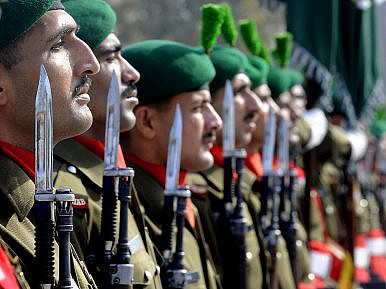By Kunwar Khuldune Shahid
 In his interview on the BBC show HARDtalk, Chief Executive Officer of Dawn Group of Publication Haroon Hameed was asked by the host Stephen Sackur to provide “evidence” for his claims that the Pakistan Army is trying to manipulate the upcoming general elections. Hameed alluded to the Pakistani intelligence agencies’ social media strategy, with trolls and bots dedicated to drive home the Army’s narrative. But he chose not to speak of more tangible evidence of how the military establishment is influencing opinion-making in the country in its bid to ensure that the politicians that it backs come to power.
In his interview on the BBC show HARDtalk, Chief Executive Officer of Dawn Group of Publication Haroon Hameed was asked by the host Stephen Sackur to provide “evidence” for his claims that the Pakistan Army is trying to manipulate the upcoming general elections. Hameed alluded to the Pakistani intelligence agencies’ social media strategy, with trolls and bots dedicated to drive home the Army’s narrative. But he chose not to speak of more tangible evidence of how the military establishment is influencing opinion-making in the country in its bid to ensure that the politicians that it backs come to power.
Even though Hameed did touch upon the censorship faced by the likes of Geo TV and Dawn itself, with cable operators and newspaper hawkers being intimidated by the Army, he did not mention the numerous candidates for the upcoming elections who have confessed to being coerced into abandoning the Pakistan Muslim League-Nawaz (PML-N). These include candidates in Balochistan, the province where the military has de facto rule.
The Dawn Group CEO didn’t refer to the Army’s meddling in the judicial affairs either, which has seen accountability being limited to the family of former Prime Minister Nawaz Sharif. Islamabad High Court judge Justice Shaukar Siddiqui claimed on Wednesday that the Army is influencing court verdicts.
For almost half of Pakistan’s 70 years an independent state, the country has been governed by direct military rule. The other half has customarily witnessed the Army’s bid to ensure that its preferred players run the civilian government, guaranteeing that the military leadership maintains its stranglehold over policymaking.
Where Imran Khan is right now, Zulfiqar Ali Bhutto and Nawaz Sharif had been before him: military stooges designed to cut popularly backed civilian leaders down to size.
Hence, not only does Sharif know what exactly is happening to him – having been on the other end of political engineering in the past – he has deliberately molded his narrative against the judicial-military complex in a bid to go all out against the establishment and help ensure parliamentary supremacy.
The fact that his ostensibly principled stand for democracy mirrors his very evident political interests is precisely why he’s pulling no punches in his struggle to ensure that the PML-N manages to come out on top on July 25, despite the ongoing political engineering.
There’s nary a doubt that at the very least sections of the Army are exercising their machinery to ensure that Imran Khan’s Pakistan Tehreek-e-Insaf (PTI) forms the next government at the expense of the PML-N. A more daunting – even if similarly barefaced – question is why this political engineering is taking place.
This is because actual parliamentary authority would entail the civilian government’s control over security and foreign policy, which is precisely the ground Sharif endeavored to gain in his third stint as the country’s premier.
Sharif’s vision – or financial interests, whichever way you might want to look at it – lies in neoliberal economic policies, which necessitate improved ties with India. Those bilateral relations, and indeed the country’s internal investment climate, depend on Kashmir-bound militancy based in Pakistan being overcome along with a widespread purge of jihadist groups.
On the contrary, not only would improved ties with India and civilian control over security policies undermine the Army’s authority – and indeed threaten to slash the perpetually rising defense budget – complete eradication of jihadist groups would take away the strategic assets that the military uses to drive home its interests both within the country and for cross-border raids.
This is why these jihadist assets are currently undergoing an Army-led “mainstreaming” process, where their political fronts will be accommodated in the Parliament, while the militants – the “good Taliban” – remain under the military’s control to be used at will.
Even though it is unlikely that the Islamist groups would find an overwhelming presence in the formulation of the next government, if nothing else their presence will slash the traditional religious vote bank of the PML-N, further paving the way for the PTI to form the government, most likely with the help of other parties and independent candidates.
A hung parliament and a fragmented government, especially one that is led by the PTI, would find it impossible to muster the consensus needed to challenge the Army’s hegemony, and could in fact pass legislation to help transfer further control to the military, which in turn would continue to breed jihadist groups in the country.
Therefore, more than Nawaz Sharif’s future or the state of democracy in the country, the upcoming election in the country is a battle for the control over the state’s hitherto duplicitous and masochistic security policy.
No comments:
Post a Comment